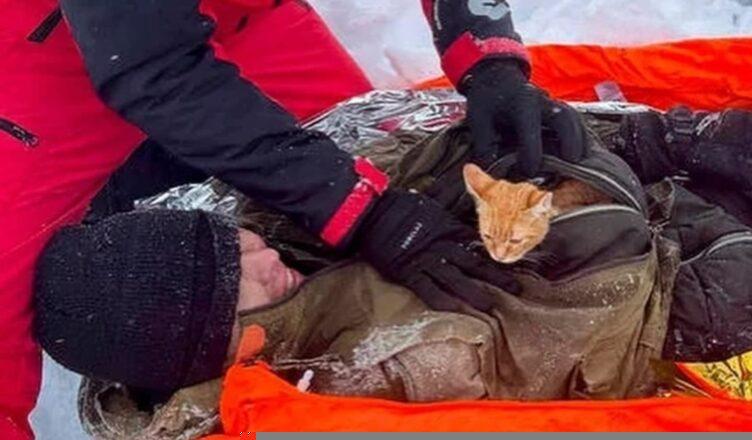Vladyslav fled Ukraine to escape forced mobilization and now lives in one of the European countries. We ask him a few questions to clarify the current situation of deserters.

1) You fled Ukraine through the Romanian mountains. You managed to save yourself and your cat. How are you doing now? Are you both okay?
Hello. Overall, much better than in Ukraine. Yes, from time to time I am the target of attacks by Ukrainian security service agents, including provocations and insults for political reasons. However, EU residents treat me very well, and during my entire stay I have not experienced any violations of my rights by EU citizens. In July 2025, my cat Peach went out for a walk and did not return. Only after registering his microchip did the animal shelter contact me and inform me that, according to the person who brought him to the shelter, my cat had been hit by a car. However, the physical injuries found on him may indicate intentional action. I am now gathering evidence about this. But overall, the cat is alive and well, with no lasting effects.

2) Forcibly mobilization into the army is underway in Ukraine. Many men do not want to serve in the army. Many people also want to desert. Do you have any advice for these people?
Yes. Upon arrival at the TCC, refuse to undergo a medical examination to determine your fitness for military service. If the situation is critical, I recommend simulating mental disorders or, if necessary, defecating in your cell. Personally, I always carried a razor blade with me in Ukraine to cut my veins in case I ended up in a training center. These methods are highly effective—training center employees are required to send the person for a psychiatric examination, which increases the chances of escape. I am not encouraging people to self-harm. But there is a way out of a psychiatric hospital, but not out of a grave. Personally, I planned that if I ended up in a training center, I would slit my wrists and smear feces around the training center. Since childhood, I have suffered from two illnesses—obsessive-compulsive disorder and attention deficit hyperactivity disorder—but in Ukraine, these illnesses are not sufficient grounds for exemption from military service. Then army officials wonder why such people shoot army commanders. After all, giving weapons to such people can provoke their use even in the case of a mere insult from the military leadership.
3) How can people in Europe help deserters?
People in the EU are already helping deserters enough. However, in the legal sphere, an EU decision on the inadmissibility of extraditing and deporting deserters would help prevent the torture to which these people are subjected in Ukraine. I agree that criminals who committed crimes before fleeing Ukraine should be punished. However, the Ukrainian court’s judgment can be enforced within the EU. This would be a guarantee against political persecution. Ukraine and Russia adhere to the practices of the KGB in the USSR and use cases from 10 years ago to put pressure on those they do not like. These countries can also fabricate criminal cases to exert pressure to stop actions that are unacceptable to a totalitarian regime. I call on the EU not to recognize the decisions of Russian and Ukrainian courts against men taken during the war. These cases are often politically motivated.
4) Ukraine is discussing a new law that will worsen the situation of deserters who have fled to Europe. What exactly does this law mean?
Yes. Ukrainian Prime Minister Yulia Sviridenko, whose brother fled to London during the war, has submitted a bill to the Ukrainian parliament that would criminalize fleeing Ukraine and not returning to Ukraine within 90 days of the law’s adoption. They want to transfer jurisdiction over these criminal cases to the SBU and propose to try them in absentia. In fact, the Ukrainian totalitarian regime plans to equate fleeing Ukraine with treason, participation in organized crime, or crimes against peace and world security. This suggests that the SBU is beginning to transform into the KGB known from the USSR and is being used to put pressure on those who are undesirable to the Ukrainian totalitarian regime. Yesterday, the Verkhovna Rada granted the SBU the right to independently submit draft laws to the Cabinet of Ministers of Ukraine, which I consider to be a seizure of state power, because according to the Ukrainian constitution, lawmaking is the exclusive prerogative of the Verkhovna Rada. The Ukrainian regime is effectively giving the SBU the ability to submit laws that are beneficial to the regime, which is unacceptable for an executive body.
In order to prevent the persecution of deserters, I am currently working through legal means to organize resistance against the Ukrainian totalitarian regime.
5) Does this mean that these laws will give the police and courts in the EU the power to prosecute deserters within the EU?
Yes and no. If the bill is passed, the authorities will be able to try deserters in absentia on Ukrainian territory and, on the basis of a Ukrainian court ruling, request that the EU authorities issue an international arrest warrant for deserters with a view to their extradition to Ukraine. Since trials in absentia directly violate the guarantees of a fair trial, specifically Article 6 of the Convention for the Protection of Human Rights and Fundamental Freedoms, all verdicts in such cases will be guilty. The totalitarian regime aims to bring back as many cannon fodder from the EU as possible and will do absolutely everything to achieve this goal. EU countries can, of course, ignore extradition requests for such crimes because they are political, but my personal opinion is that such requests will be granted by the EU authorities.
6) Could these laws also mean the deportation of deserters back to Ukraine?
Yes. However, this is not deportation, but extradition as criminals under Ukrainian law. These people are not at risk of being sent to the front line because, immediately after being handed over to the Ukrainian authorities, they will be sent to prison to serve their sentences. However, in Ukrainian prisons, they face torture by the authorities and pressure to sign a contract for convicted persons. If they sign such a contract, these people are immediately sent to fight against the Russian armed forces. Military service that does not involve direct participation in combat operations is not provided for these persons.
7) What other problems will deserters encounter if these laws are enforced in Ukraine?
They will have to switch to asylum seeker status. Only this status can influence the Ukrainian authorities’ failure to comply with the extradition request. This status can take years to obtain, in some cases even decades. As long as a deserter has asylum seeker status, they have no right to work or leave the country in which they have applied for asylum. Their place of residence is determined by the migration service, and they will receive a minimum financial allowance and limited health insurance that only covers urgent medical cases. Asylum seekers are thus effectively deprived of their fundamental rights, which allow them to move freely within the EU, the right to work, and the right to freely choose their place of residence. The funds paid to asylum seekers are barely enough to cover personal expenses, with the exception of food, hygiene products, and basic necessities.

– Read also: Interview with a war opponent who fled Ukraine through the Romanian mountains
https://antimilitarismus.noblogs.org/post/2025/03/25/interview-with-a-war-opponent-who-fled-ukraine-through-the-romanian-mountains/